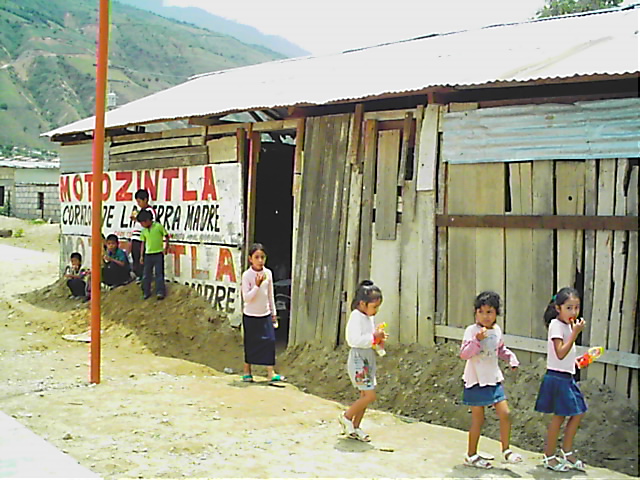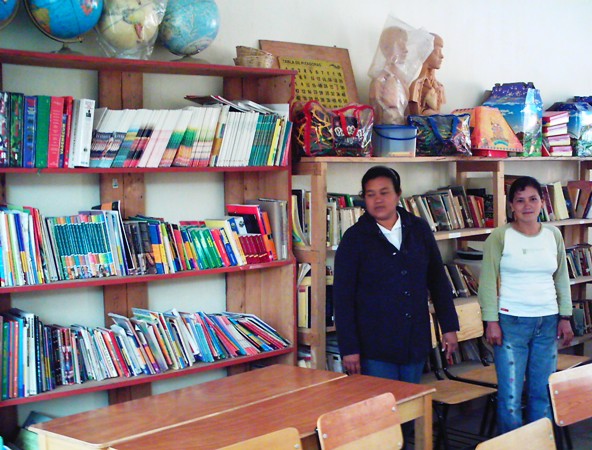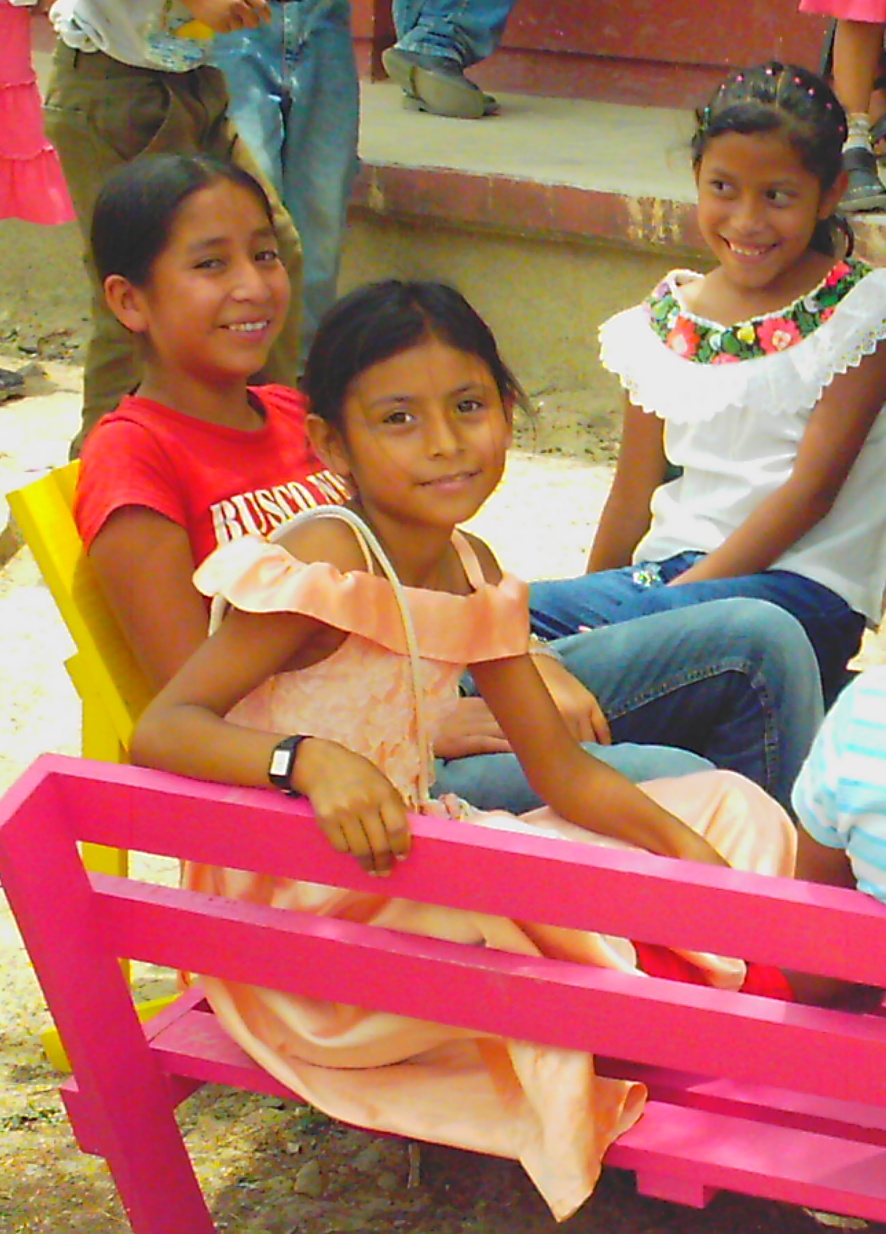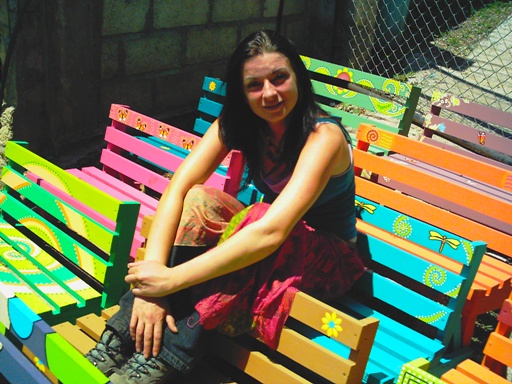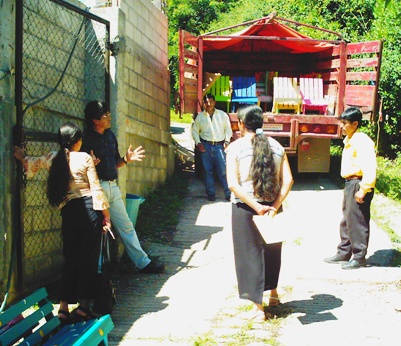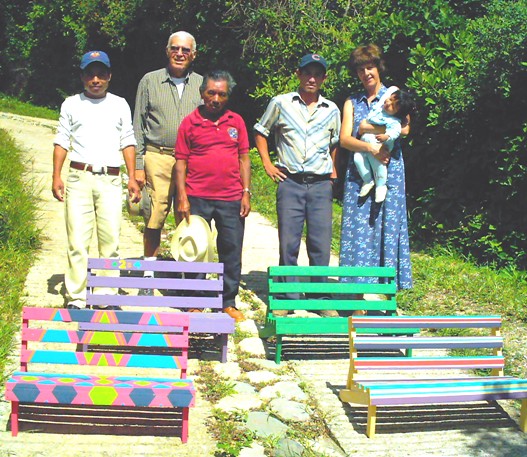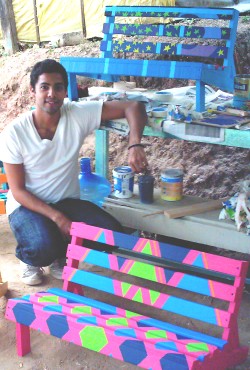# Supporting dignified education for indigenous children
# All of the work of the Sexto Sol Center benefits children
When we ask people what they would wish to achieve by participating in the projects of the Sexto Sol Center, the answer usually is that they want their children to stay in school. There are many barriers to their receiving an education. Poor nutrition prevents children from being able to concentrate. Even the cost of schools supplies can keep a child out of school. The laobr-intensive task of collecting firewood for cooking fuel can mean that children loose days in the classroom. Children from the poorest families have to work as street vendors, missing out entirely on school and childhood.
The Sierra Madre of Chiapas is home to the Mocho, Mam and Kachiquel peoples. In Mexico there is a separate educational system for indigenous children which leaves schools struggling with inadequate funding, facilities and materials. People are concerned that their languages and cultural expression have suffered as a result of past discrimination. The Sexto Sol Center is committed to assisiting them as they work to find ways to revitalize their cultures. Education can be an important part of that process as well its being the fundamental way a child gains the a tools to construct a way out of poverty.
The Sexto Sol Center advocates for the right of all children to receive a quality education that honors the history and culture of their community. Since 2005 we have been working with parents´ organizations to improve school grounds and buildings and to find ways to make the indigneous culture and language more central to instruction. We have also provided over $2,000 dollars worth of books to the community library in Nuevo Bullaj, Guatemala. You can read about this effort below.
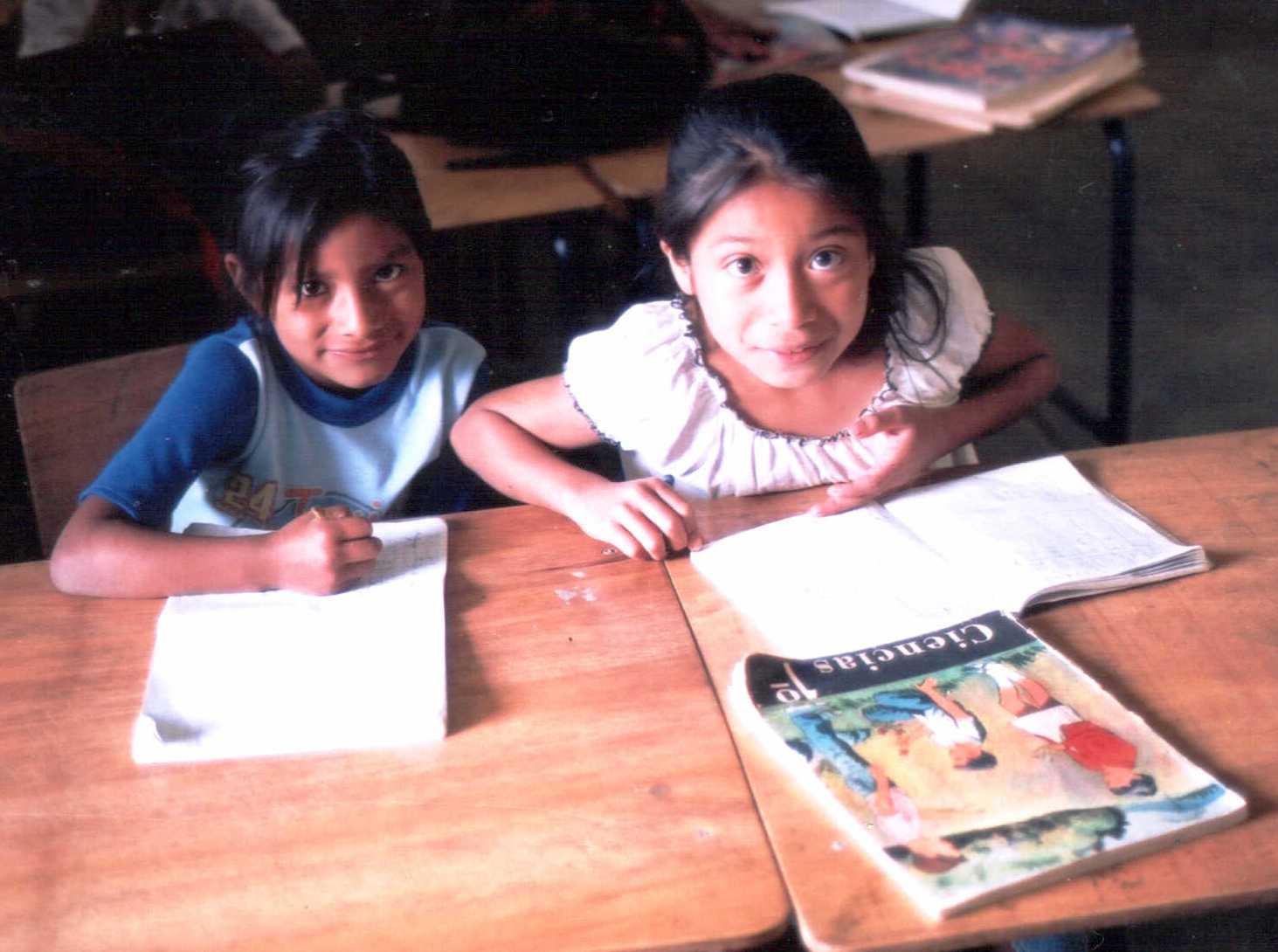
# Left: Students in Nuevo Bullaj, Guatemala, Right: 74 children attend this dirt-floor school in the flood zone built of a discarded road sign and plastic
# HELP US REACH OUR FUNDING GOALS TO IMPROVE EDUCATION FOR OVER 800 CHILDREN
- Install solar "bottle lights" in remote schoolhouses
- Install solar heaters, now kids have to go home when too cold
- Remove hazards, fence grounds, build playgrounds (2)
- Provide books, develop curriculum for school w/o funding
- Create drainage system in school that floods DONE!
- Build a simple classroom for a "school" with no building
- Train librarian for community library serving 300 children
- Buy Books, books, books for poorest schools
| --- | | Never hesitate when you feel the urge to act from kindness |
# Recent Accomplishments
January, 2010: Success! Thanks to a grant from Water Charity, we have installed 260 meters of rain gutters on buildings at an elementary school located at 10K elevation. The school had suffered from flooding which made classrooms dark and wet. With just 400 dollars we can tie up loose ends.
BOOKS, BOOKS, AND MORE BOOKS!
Corporate sponsors:

In 2005 Barsa Planeta de México S.A. de C.V. made a generous donation of books in solidarity with the children of Chiapas where schools were devastated by Huracán Stan. Included was an encyclopedia set as a gift to Asociación de Campesinos Nuevo Bullaj, for their school library.
Royal Coffee of California made a generous gift for the Nuevo Bullaj library in Guatemala.
Special thanks to Melinda Matson for her contribution of books for Nuevo Bullaj.
PROVIDING BOOKS TO ENCOURAGE READING AND IMPROVE EDUCATION
Sexto Sol provides books to schools in the poorest communities where they will most benefit children.
Escuela Bilingue Estado de Colima (see painting project below) inaugurated a new library in May, 2007 to hold the books that Sexto Sol contributed: In 2006 The Sexto Sol Center made a substantial contribution of books to this school that serves indigneous children in the high mountains. Due to our involvement with teachers and parents toward improving the school, the school won a status that earned them additional teaching materials and other support from a state program that rewards schools where there is demonstrated commitment to improve.
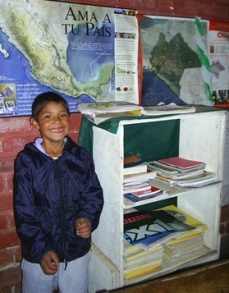
# The new library is a far cry from the original shelf with a few books.
Reference books provided to the UNICACH university: UNICACH is the only center of higher learning in the Sierra Madre. Students from the mountain communities prepare for careers in agronomy, environmental science and other fields. Resources are very limited and currently the classes are held in the old high school that was abandoned due to flood damage. Since its beginning four years ago, students have used our Escuela de Agroecología y Permacultura Tierra Linda as a resource and we have assisted students who seek our advice for developing their thesis. Among the first graduates are two students we mentored.
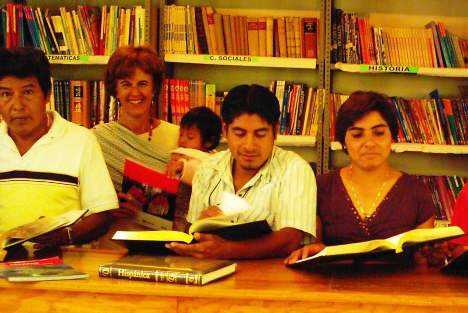
Sexto Sol delivered an 18 volume set of encyclopedias to the Escuela Secundaria Tecina #41: The school provides technical education in agronomy and other practical fields to Mam children in the high country. The principal of the school encourages teachers to strive for excellence in teaching the students from surrounding communities where most families live in poverty. Former students nominated the school to receive the encyclopedias which are an important addition to their small library. The encyclopedias were contributed to Sexto Sol by the publisher Barsa Planeta.
# Photo: The principal and librarian look at the encyclopedias with volunteer Eliazin Cifuentes (center)with Executive Director Tamara Brennan
School supplies for remote schools: Sexto Sol volunteers Ranulfo and Eliazin delivered schools supplies, art supplies, posters of cultures and nature, and books to 7 one-room schools in remote communities in the Sierra and to the bilingual schools in Motozintla.
HANDMADE BENCHES PROVIDE A PLACE TO READ AND PLAY
Francisco Barrios, Program Coordinator, builds wooden benches for schools The schools have no formal play areas, no recreational equipment and no trees. Francisco wants to change that and these benches are the beginning of his effort to make attractive play and study areas for the children. In 2006, Artist and illustrator Diane Lees painted delightful designs on dozens of benches. Five schools have already received benches and we receive requests from communities very far into the mountains for more.
USING ART TO ENCOURGE RESPECT FOR CULTURE AND THE ENVIRONMENT:
Diane Lees also painted original art for posters with environmental messages in Mocho and Mam. These posters are distributed to the schools.
Josue Diaz was our volunteer artist in residence in November, 2006, providing art instruction aimed at encouraging the children to celebrate their indigenous identity. He worked with over 130 children in 5 classrooms at the Escuela Bilingue Iliahucamina Moctezuma and the Escuela Bilingue Lazaro Cardenas. Josue, a graphic designer, also painted benches that were donated to a school in a remote community.
Josue organized the Na Balom center in San Cristobal de las Casasa to sponsor a drive to collect notebooks, art supplies and books in Mocho and Mam languages. Teachers here were pleased to receive the much needed supplies.
HELPING PARENTS BRING IN MORE LIGHT TO THEIR CHILDREN'S CLASSROOMS
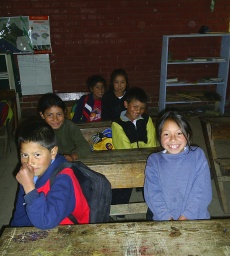
Photo: the dark classrooms before Sexto Sol helped parents paint 9 classrooms.
The Escuela Primaria Colima serves 260 elementary school children from the most impoverished community in the Sierra, El Malé. Most of the year the climate is harsh with fog, heavy rain and biting cold. With poor lighting, broken windows and no heat, on the coldest days, teachers take the children outside to sit in the soft sunlight since it is too cold to work inside.
Hurricane Stan struck the region the day before we were to work at this school. As soon as we could get through the debris, we worked with the parents to paint the dark classrooms light colors to bring in more light. Contributors to this project made it possible for Sexto Sol to help parents enjoy the satisfaction of making improvements themselves to their childrens' school. The faces of the painting crew say it all!
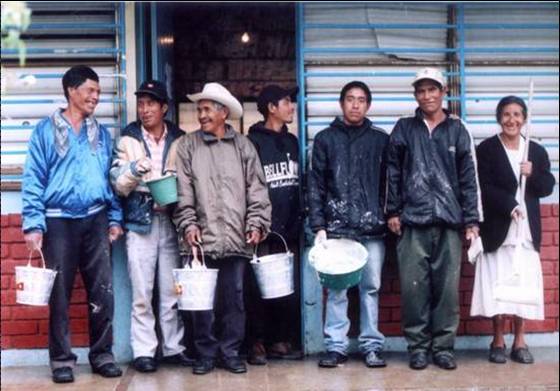
In 2010 we installed drainpipe to eliminate flooding that had made the classrooms cold and damp. What a difference!
MORE PROJECTS TO SUPPORT CHILDREN FROM REMOTE COMMUNITIES
The Albuergue Providencia is a boarding house run by Catholic nuns to provide a safe place for young girls to stay while they study in Motozintla. Girls come from remote communities without schools. We have provided assistance to the Sisters for several years. In 2003 we provided permaculture training to the parents of the girls. In 2004 we built large planters for vegetable production to allow the Sisters to include vegetables in the food the girls eat. We continue to maintain the garden there.
Escuela Secundaria Tecnica #122, Bajucu, Las Margaritas - creating a permaculture demonstration center for boarding school for 260 Tojolobal-speaking children. Sexto Sol assited the faculty to obtain funds to build a greenhouse for vegetable production and teaching purposes.
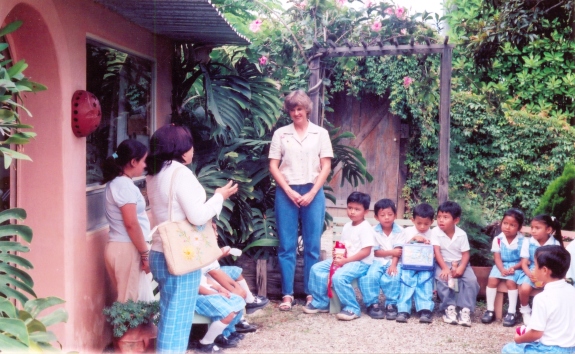
At Escuela de Agroecologia y Permacultura Tierra Linda, we provide environmental education to the children living in the surrounding neighborhoods and students from community schools. Kids come to the school on their own with homework questions or just to "learn about nature." In August, 2005, six children helped to plant over 500 oak trees in the bare spots in the forest. Please see the Agroecology School page for photos of some of our younger visitors to the farm.
# Nutritional Support for malnourished school children: Blue-Green Algae
Thanks to a generous donation of a super-food by Klamath Blue Green, Inc in 2000 we provided nutritional algae, high in minerals and vitamins, for 60 second and third graders at a rural school in the heart of the coffee producing region. Two teachers gave the children these tablets daily at the school. They noticed that the children, many of whom were malnourished, showed better concentration and memory retention.
SOLAR OVENS CAN KEEP CHILDREN IN SCHOOL
Anyone who has traveled in Central America has probably seen children laboring along the side of the road under the weight of unwieldy bundles of firewood, machete dangling from their belts. Cooking with a solar oven means that families do not have to send their children out to cut firewood, a tedious and ecologically damaging practice. Sexto Sol teaches people how to make and use solar ovens that cook food with the sun.
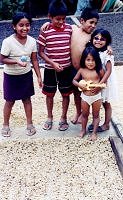
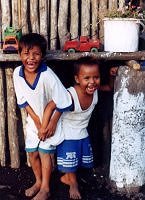
HELPING CHILDREN COPE WITH THE TRAUMA OF HURRICANE STAN
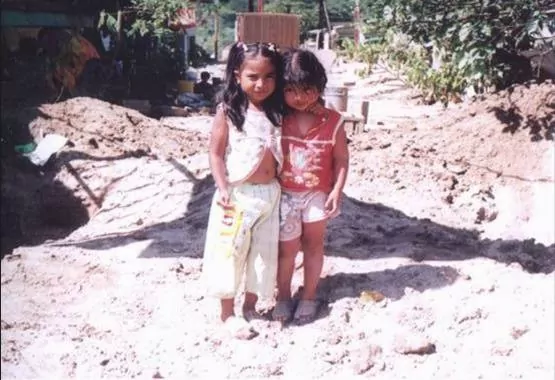
# October 9, 2005: Cousins stand on mud deposited on their house by Hurricane Stan
In response to the massive numbers of people affected by the hurricane, Sexto Sol sponsored a training for medical professionals and traditional doctors in a technique to treat trauma and stress. Dr. Tamara Brennan, Executive Director has been treating children and their families ever since.
We put out a call to knitters to make hats for children who lost their homes in the flood. The response to the "HATS FOR KIDS CHALLENGE" was fantastic. See the Hurricane Stan section for more information on Sexto Sol's assistance to survivors. Reconstruction, including emotional recovery, will take many years.
| --- | | THE HATS FOR KIDS CHALLENGE WAS A BIG SUCCESS - PROVING ONCE AGAIN THAT THERE ARE MANY COMPASSIONATE PEOPLE (July, 2006) Children have been especially impacted by Hurricane Stan. Hundreds of families in the remotest areas are living in makeshift housing. In December we put out an invitation to people who crochet and knit to make hats for the children of a community that was completely destroyed in the flood. Over 40 people in Canada, the U.S. and three in Motozintla made over 150 big hats, baby hats, brightly colored ones, dignified and funny hats - all sorts in every color imaginable, each one unique. But what each had in common was the intention of the person who made it that their creation help to ease some of the fright that these little people endured. Our knitters ranged in age from 13 to 93 and live all over North America In California, Rosemary Brennan got her friends together to make dozens of hats. Hats were sent from friendly places like "Heartlights" and "Storybook Farm". People sent photos of themselves with their children, or their grandchildren and one woman sent a snapshot of herself with her horse. We received 62 toothbrushes and perfumed soaps. Click for pictures of Hat Makers. The community of 23 de Abril was totally destroyed by a 50 foot wall of water, rock and debris on October 4, 2006. On March 10, we took hats, toothbrushes and the good wishes of "Madrinas" from thousands of miles away to the children of the resettlement camp. With lots of giggles and smiles the kids were ceremoniously "hatted". As we drove away from the encampment and its temporary tent school, a little girl ran out of her makeshift home to wave, pointing to her pretty pink and white hat, sent with love from somewhere else on our continent. It was an image to remember always. Thank you to all the people who saw the importance of letting these children and their families know that you care about them. Your message of care for these children was received. Hat Makers - Madrinas Esthela Alfonso Gordillo, Motozintla, Chiapas, Mexico; Frances Avery, Marina, California, USA; Maryann T. Beverly, Columbia, South Carolina, USA; Rosemary Brennan & Friends, Banning, California, USA; Tamara Brennan, Motozintla, Chiapas, Mexico; Myrna Costalone, Boulder, Colorado, USA; Catriona Ferguson, Mount Vernon, Iowa, USA; Heartlights, Mount Vernon, Iowa, USA; Joan Himmelhoch, New York, New York, USA; Janet Hirschhorn, Methuen, MA, USA; Jan Hudson, San Francisco, California, USA; Intermountain Youth Center, Santa Fe, New Mexico, USA; Judith James, North America; Nancy Joy & Elfie, Mount Vernon, Iowa, USA; Suze Laporte, Owen Sound, Ontario, Canada; Mary McCrohn, San Francisco, California, USA; Jacob and Bonnie McLean, Asheville, North Carolina, USA; USA; Paula Nath, East Middlebury, Vermont, USA; Ann Scharin, Vernon Rockville, Conneticut, USA; Terri & Kerri Schnarr, Kitchener, Ontario, Canada; Katherine Solomon, Sutton New Hampshire, USA; Storybook Farm, South Hampton, Ontario, Canada; Miriam Stein, Toronto, Ontario, Canada; Debra Tobin, Tucson Arizona, USA; Theresa Tokasz, Laurens, South Carolina, USA; Sharon Wilkie-Mortl, Silver Spring, Maryland, USA; Greg Willson & Friends, Nederland, Colorado, USA; Evelyn Winston, Mount Vernon, Iowa, USA. Solidarity in time of crisis is one of the highest forms of human caring. |
 The Sexto Sol Center
The Sexto Sol Center 
